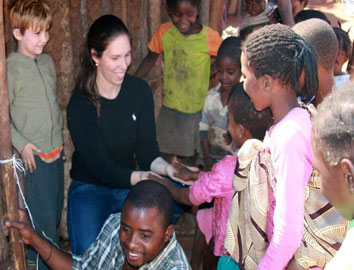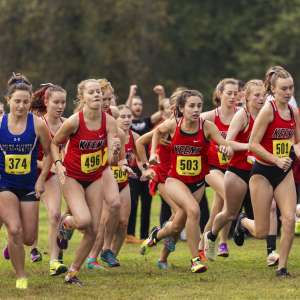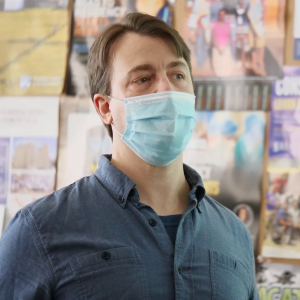Henning Helps Keene State Health Science Go Global

You might not see any construction crews, but the academic walls at Keene State College’s Joslin House, home to the school’s Health Science Department, are gradually expanding. Thanks to Meg Henning, an assistant professor of health science, and her colleagues, students are not only gaining insight about the subject from a local, regional, and national perspective, but they’re getting a broader understanding of the issues related to global health.
“Students are very eager to learn and recognize that we live in a global society,” said Henning, who came to Keene State in 2010. “Students are looking for those connections because that’s what they want to do or they want to explore.”
Henning is quick to point out that the public health field is growing. Increasing global health and environmental changes, such as HIV/AIDS and H1N1 flu, natural disasters, global warming, and poverty, all call for coordinated global responses. “When we think about global health we need to consider work that is either national or international. It’s not just international,” she said.
Keene State students aren’t alone. According to Henning, global discussions have becoming predominant in American higher education. Citing a study entitled “Global Health and US Academia: Converging Interests,” Henning points out that health science is sixth of 16 fields that are drawing interest in international study, and over 75 percent of students applying to college are interested in pursuing careers that in some way incorporate global elements.
According to the Association of American Colleges and Universities, colleges need to prepare students to succeed in a global economy. Many business leaders rate knowledge and awareness of the wider world – such as the ability to speak a foreign language – as important proficiencies. The demand for global health training is soaring.
Becky Dunn, an associate professor and chair of the health science department at Keene State, acknowledges the trend, but feels the shift can’t happen overnight. “Our students are sometimes not ready to understand global connections. You need to build up until you get to that level. And I think that’s what Meg tries to do. She says: Here’s where they are and here’s where I want them to go. But it takes time.”
“The global health piece could be an asset for us,” Brown added. “We’re trying to figure it out. “We don’t want to just create a course, but to find a way for students to start participating in global issues while they are at Keene State.”
Looking to expand its curriculum to include a global health component, Keene State couldn’t have found a better initiator than Henning. Born in Concord, NH, but raised abroad, Henning got an early indoctrination in the world of global heath from her father, Dr. Rick Henning, who has held various positions around the world, most recently with PATH, an international nonprofit that transforms global health through innovation.
Noting that the apple doesn’t fall far from the tree, Henning felt her own exposure, coupled with a strong fatherly influence, played a major role in her early interest in the health of others. “He has been one of my most influential teachers in regards to his work ethic, compassion, and understanding of public health,” said Henning about her father.
After primarily attending international schools where she was able to experience cross-cultural lifestyles, Henning returned to New Hampshire in 1996, attending New England College in Henniker, where she earned a degree in psychology. A self-described global nomad, Henning continued developing her international experiences, interning as a caseworker in London and Kenya.
Receiving a master’s degree in health and behavior studies from Columbia University, Henning returned to Zambia to work for the Society of Family Health International before going on to Oregon State where she not only earned a PhD in philosophy, health promotion, and health behavior with a concentration in international health, but discovered a love for teaching.
“I think of myself as an introvert, so I was really nervous being in front of a class at first,” admitted Henning. “However, I realized I love to teach and still do the work I love internationally,” she said. “I think a strong teacher needs to stay engaged outside the classroom.”
Arriving at Keene State along with her husband, Doug Wilcox, an adjunct lecturer in the College’s Theatre and Dance Department, Henning was anxious and excited about adding an international component to the school’s relatively new health science option. “I wanted to jump right in and develop a global agenda right away, but I also knew it was important to understand the Keene State culture and be sure that our program first had the foundational structure,” she said. “We are now at a point where we can start to think about how we want to include global health. There seems to be student demand for such a course.”
“Because of her background, Meg brings a different perspective – a global view,” said Brown. “Oftentimes we’ll say, Why don’t we think about doing it that way? It really enriches the conversation to be much more inclusive, rather than just thinking about things from a United State or New Hampshire viewpoint.”
Henning continued to travel abroad, presenting with co-author Dr. Chunheui Chi a paper, “Exploring Factors Associated with a Teacher’s Self-efficacy in HIV-prevention Education in Lusaka, Zambia,” at the Sixth International Society for Equity Heath conference in Cartagena, Columbia. Her presentation helped Henning earn a highly prestigious Takemi Fellowship from Harvard’s School of Public Health in 2012.
Henning said, “It was a wonderful honor to sit at the table with some outstanding individuals and leaders in global health.”
Henning is only the ninth American to receive the fellowship, an interdisciplinary research program that focuses on the problems of mobilizing, allocating, and maintaining limited resources to improve health.
Henning’s interests in public health are far-reaching, and are both international and national. The majority of her work falls under the umbrella of maternal and child health. Last summer, Henning continued her work with Harvard. Supported by the Regional Psychosocial Support Initiative for children affected by poverty, conflict and HIV and AIDS, she traveled to Zambia to complete field research in the area of psychological support and education orphans and vulnerable children. “It’s important to work with organizations on the ground so that research is positioned to go back to the community,” said Henning, who also constantly works to integrate her own research and experience into the classroom in a meaningful way.
Henning’s national work currently focuses on understanding the importance of working with the local population. She and colleagues Becky Dunn, Karrie Kalich, and Rudy Fedrizzi have worked on a multi-year local study that has helped form the basis of a community action plan to make it easier for mothers in New Hampshire to breastfeed their babies. “Meg brought a valuable component to our research,” said Dunn, an associate professor at Keene State. “She is a processor. You can tell that the wheels are turning. She brings a fresh perspective to what we’ve been talking about or working on.”
Back in the classroom, Henning feels it’s important that her students think globally as well as locally. “I bring in a local piece, but I bring in the international piece too,” said Henning. “It’s critical because students live in a world where we are connected – more so than ever before.”
Students like Shelby Love and Kelsey Bumsted appreciate Henning’s ability to bring her vast experience and knowledge of international issues into the classroom. “Dr. Henning’s lively classroom discussions reflect her past achievements and life experiences,” said Love, a senior from North Conway. “She is able to educate her students following her journeys around the world.”
“Professor Henning provided us a global health perspective that other teachers can’t bring to the table,” said Bumsted, a senior from Exeter. “She was always thinking out of the box, trying to get students involved by offering different ideas with the people or videos she brought into the classroom. Students were really motivated to do well in her class.”
Keene State’s small classroom size also allows Henning the ability to better connect with her students. “I think KSC students are very lucky. We get to know who the students are and how they’re doing,” said Henning. “It’s not necessarily where you go to school, but it’s your personal relationships with faculty and how students are engaged and involved during their time in college that can make a real difference.”





